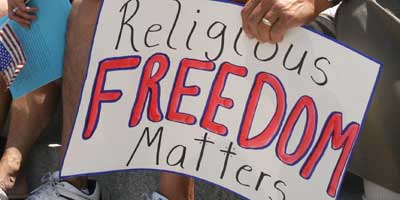
 CHARLESTON—Hundreds of people raised their voices in a demand for religious freedom during a rally at the U.S. Custom House in Charleston. Another was held in Greenville, and about 160 other cities nationwide.
CHARLESTON—Hundreds of people raised their voices in a demand for religious freedom during a rally at the U.S. Custom House in Charleston. Another was held in Greenville, and about 160 other cities nationwide.
Participants at the ecumenical rally said they’re concerned that the health care mandate is just the first step toward government interference in religion. They promoted the message that everyone should work together and serve as Christ did and not be limited by which church they belong to.
The rally specifically targeted the health care issue, but Bishop Robert E. Guglielmone said there are wider implications. As a way to awaken people and stir them to action, U.S. bishops issued a statement titled “Our First, Most Cherished Liberty” and have called for a Fortnight for Freedom June 21 to July 4. This two-week period of prayer, fasting and catechesis is intended to raise awareness of the threats facing religion.
The immediate problem is the narrow definition — which has arisen from the mandate of what is considered a religious entity — Bishop Guglielmone said.
By saying that the work force must be Catholic and the people they serve must be Catholic, the government is limiting those under the religious umbrella to just houses of worship.
So if you’re worshipping in church, great, but if you’re giving food to a poor person, well, that’s not considered a church ministry. Schools, hospitals, outreach programs, all are in jeopardy.
“They’re not offering us freedom of religion. What the government is offering us is freedom of worship, and that’s not right,” the bishop said.
Msgr. Steven L. Brovey, rector of the Cathedral of St. John the Baptist, helped plan Fortnight for Freedom events. He said it is about the freedom to practice faith as one believes and not as a king or president decrees.
“That’s the heart of the issue,” he said. “No one can tell us what it is to be Catholic and how we can practice our faith, or other faith traditions.”
A big part of that includes concerns over the Department of Health and Human Services’ mandate that health plans include contraception, sterilization and some abortioninducing drugs free of charge, even if the employer is morally opposed to such services.
Although this mandate strikes hardest at Catholic organizations, it should cause concern in all religious believers, and indeed all people who value the Constitution and civil liberties, the U.S. bishops wrote.
Cardinal Timothy M. Dolan of New York has taken the church’s case to the public via various news shows.
“The exemption given to the church is so strangling and so narrow,” Cardinal Dolan said. “They tell us that if you’re really going to be considered a church, that if you’re going to be really exempt from these demands of the government, well, you have to propagate your Catholic faith and everything that you do, you can serve only Catholics, and you can employ only Catholics.
“When did the government get in the business of defining for us the extent of our ministry? It’s almost like we’re being punished for the fact that we serve a lot of people.” The intrusion on religious rights led 43 Catholic dioceses, schools, hospitals, social service agencies and others to file suit against the federal government. They are seeking to nullify the HHS preventive care mandate and declare it unconstitutional.
Bishop Guglielmone said it is not about contraception — which is available on the market — it is about the government trying to force the church to do something against its teachings.
The Diocese of Charleston is not part of the suit, but they have taken action in other ways. St. Theresa the Little Flower Church in Summerville and the Ancient Order of Hibernians of Greenville both created billboards encouraging people to join the battle for religious freedom.
Bishop Guglielmone urged all parishes to take the lead and involve their congregations and community, stressing that this threat requires action.
As the U.S. bishops wrote, an unjust law is no law at all and cannot be obeyed; “one does not seek relief from it but rather its repeal.”
